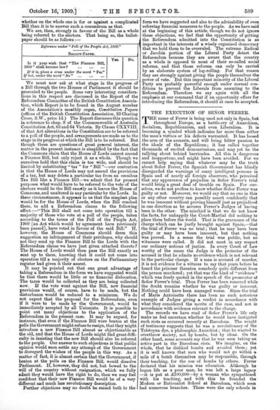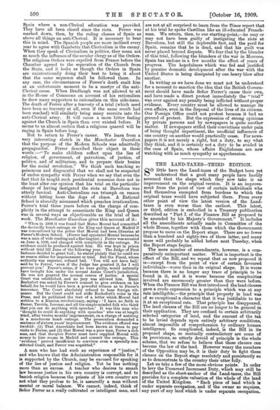THE EXECUTION OF SENOR FERRER.
THE name of Ferrer is being used not only in Spain, but throughout Europe, as a battle-cry of Anarchism, Socialism, Republicanism, and even Liberalism. It is becoming a symbol which indicates far more than either the man's virtues or his defects warranted. It has loosed the arm of the assassin, and will bring bitter passion to the ideals of the Republican ; it has called together thousands of excited demonstrators, and may yet be the rallying shout behind barricades. All this is dangerous and inopportune, and might have been avoided. For we cannot help saying that whatever may be the truth about Senor Ferrer, the Spanish Government has blindly disregarded the warnings of many intelligent persons in Spain and of nearly all foreign observers, who perceived that any appearance of prejudice in Senor Ferrer's trial would bring a great deal of trouble on Spain. For our- selves, we do not profess to know whether Senor Ferrer was guilty or not. Moreover, we would say that no one in this or any other country can possibly assert confidently that he was innocent without proving himself just as prejudiced in one direction as he accuses Ferrer's Judges of having been in the other. The mischief is that we do not know the facts, for unhappily the Court-Martial did nothing to place them before the world. That is the gravamen of the charge which can be justly brought against Spain,—that the trial of Ferrer was no trial ; that he may have been guilty or may have been innocent, but that nothing was proved.. In a sense the trial was public, but no witnesses were called. It did not meet in any respect our ordinary notions of justice. In every Court of Law worthy of the name the Judge is the protector of the accused in that he admits no evidence which is not relevant to the particular charge. If a man is accused of murder, it is not evidence for a witness to say that years before he heard the prisoner threaten somebody quite different from the person murdered.; yet that was the kind of " evidence " which was freely quoted in the speech of the prosecutor at Seiler Ferrer's trial. Thus Ferrer has been removed. while the doubt remains whether he was guilty or innocent. Nothing could have been managed worse. Since the trial of Marie Antoinette there has been no such notorious example of Judges giving a verdict in accordance with what they considered the merits of the case, and not in accordance with evidence relevant to the charge.
The records we have read of Senor Ferrer's life only make us feel uncertain whether he would have instigated such riots as occurred recently at Barcelona. The weight of testimony suggests that he was a revolutionary of the Tolstoyan dye, a philosophic Anarchist ; that he wanted to overthrow society, not by bombs, but by ideas. On the other hand, some accounts say that he was seen taking an active part in the Barcelona riots. We imagine, on the whole, that he disliked bombs and avoided them ; yet it is well known that men who would. not go within a mile of a bomb themselves may be responsible, through their teaching, for the use of bombs by others. Ferrer declared. that his mission was education. Although he began life as a poor man, he was left a large legacy it is put at £100,000—by a woman who sympathised with his teaching, and with this he founded the Modern or Rationalist School at Barcelona, which soon had numerous branches. These were the only schools in Spain where a non-Clerical education was provided. They have all been closed since the riots. Ferrer was marked down, then, by the ruling classes of Spain as above all things an anti-Clerical. It is necessary to bear this in mind. The Spanish people are more inclined every year to agree with Gambetta that Clericalism is the enemy. When they speak of Clericalism in politics, they mean not so much the influence of the secular clergy as of the Orders. The religious Orders were expelled from France before the Chamber agreed to the separation of the Church from the State, and it looks as though the Orders in S • are unintentionally doing their best to bring it about that the same sequence shall be followed there. In any case, the circumstances of Ferrer's death exalt him at an unfortunate moment to be a martyr of the anti- Clerical cause. When Bradlaugh was not allowed to sit in the House of Commons on account of his rationalism he drew many supporters to rationalism on this side-issue. The death of Ferrer after a travesty of a trial (which need have been no travesty at all, even if the same result had been reached) will similarly bring many recruits into the anti-Clerical army. It will cause a more bitter feeling against the Church in Spain than ever existed before. It seems to us almost certain that a religious quarrel will be raging in Spain before long. But to return to Ferrer's career. We learn from a very interesting sketch in the Manchester Guardian that the purpose of the Modern Schools was admittedly propagandist. Ferrer described their object in these words :—" To make children reflect upon the lies of religion, of government, of patriotism, of justice, of politics, and of militarism, and to prepare their brains for the social revolution." We think such teaching so poisonous and disgraceful that we shall not be suspected of undue sympathy with Ferrer when we say that even the fact that he taught such pestilential nonsense does not in the least alter our opinion that his trial on the particular charge of having instigated the riots at Barcelona was utterly farcical. Anti-Clericalism can triumph on reason without letting loose the dogs of chaos. A Rational School is absurdly misnamed which preaches irrationalism. Ferrer's trial three years before on the charge of com- plicity in the attempt to assassinate the King and Queen was in several ways as objectionable as the trial of last week. The Manchester Guardian gives this account of it:
" When in 1906 it was found that Mateo Morral had committed the dastardly bomb outrage on the Ring and Queen at Madrid it was remembered by the police that Morral had been librarian at Ferrer's Modern School. (Ferrer had appointed Morral because he was a man of wide reading and a fine linguist.) Ferrer was arrested on June 4, 1906, and charged with complicity in the outrage. No evidence could be produced against him. He was kept in prison without trial till June of the following year. The judge of First Instance decided to grant bail ; he stated plainly that he could see no reason either for imprisonment or trial. But the Fiscal, whose
authority was superior, refused You will not have bail,' said he to Ferrer, even if the Judge has granted it for I will prevent you.' Ferrer's crime, if he were guilty, would naturally have brought him under the normal Assize Court's jurisdiction. He was not granted the normal course of justice. A special Court was established, and no jury was allowed him. Henri Rochefort was asked by Ferrer's counsel to give evidence on his behalf, for he would have been a powerful witness as to Ferrer's innocence. The Court absolutely refused to hear foreign wit- nesses. But the Court could not stifle Rochefort's voice in the Press, and he published the text of a letter which Morral had written to a Russian revolutionary, saying : I have no faith in Ferrer, Tarrida, Lorenzo, and all the simple-minded folk who think that you can do anything with speeches.' It was this man who 'thought he could do anything with speeches' who was at length tried, after twelve months' imprisonment, on a charge of assisting in a murderous bomb outrage. The prosecution demanded a sentence of sixteen years' imprisonment. The evidence offered was twofold : (1) That Anarchists had been known at times to pay visits to Ferrer, and (2) that Morral was a poor man, Ferrer a rich man, and that therefore Ferrer must have supplied Morral with money to hire rooms in Madrid and commit the outrage. This ' evidence ' proved insufficient to convince even a specially con- stituted Court, and Ferrer was acquitted."
A man who has had such an experience of " justice," and who knows that the Administration responsible for it is supported by the Church, may be excused for speaking of the lies of justice and religion. Yet he has nothing more than an excuse. A teacher who desires to smash law because justice in his own country is corrupt, and to banish religion because the priests of his own country are not what they profess to be, is assuredly a man without mental or moral balance. We cannot, indeed, think of Senor Ferrer as a really cultivated or intelligent man, and are not at all surprised to learn from the Times report that at his trial he spoke Castilian like an ill-educated French- man We return, then, to our starting-point,—he may or may not have been guilty of instigating the riots at Barcelona, but still the deplorable fact, and the peril for Spain, remains that he is dead, and that his guilt was never placed beyond dispute. We fear that by the blunder of this trial, following the blunders of the war in Morocco, Spain has undone in a few months the effect of years of progress. The hopefulness which was fed and justified by genuine domestic development after the war with the United States is being dissipated. by one heavy blow after another.
In writing as we have done we must not be understood for a moment to sanction the idea that the British Govern- ment should have made Sefior Ferrer's cause their own, and have made a direct protest immediately the " trial " was over against any penalty being inflicted without proper evidence. Every country must be allowed to manage its own affairs, even in the disposal of the lives of its citizens. Our Foreign Office could not protest because it had no ground of protest. But the expression of strong opinions by private persons and by newspapers is quite another matter. If newspapers stifled their convictions under pain of being thought impertinent, the unofficial influences of one country on another would practically cease. For news- papers it is not merely a right, but a duty, to say what they think, and it is certainly not a duty to be evaded in the case of Spain, whose affairs Englishmen are now watching with as much sympathy as apprehension.















































 Previous page
Previous page